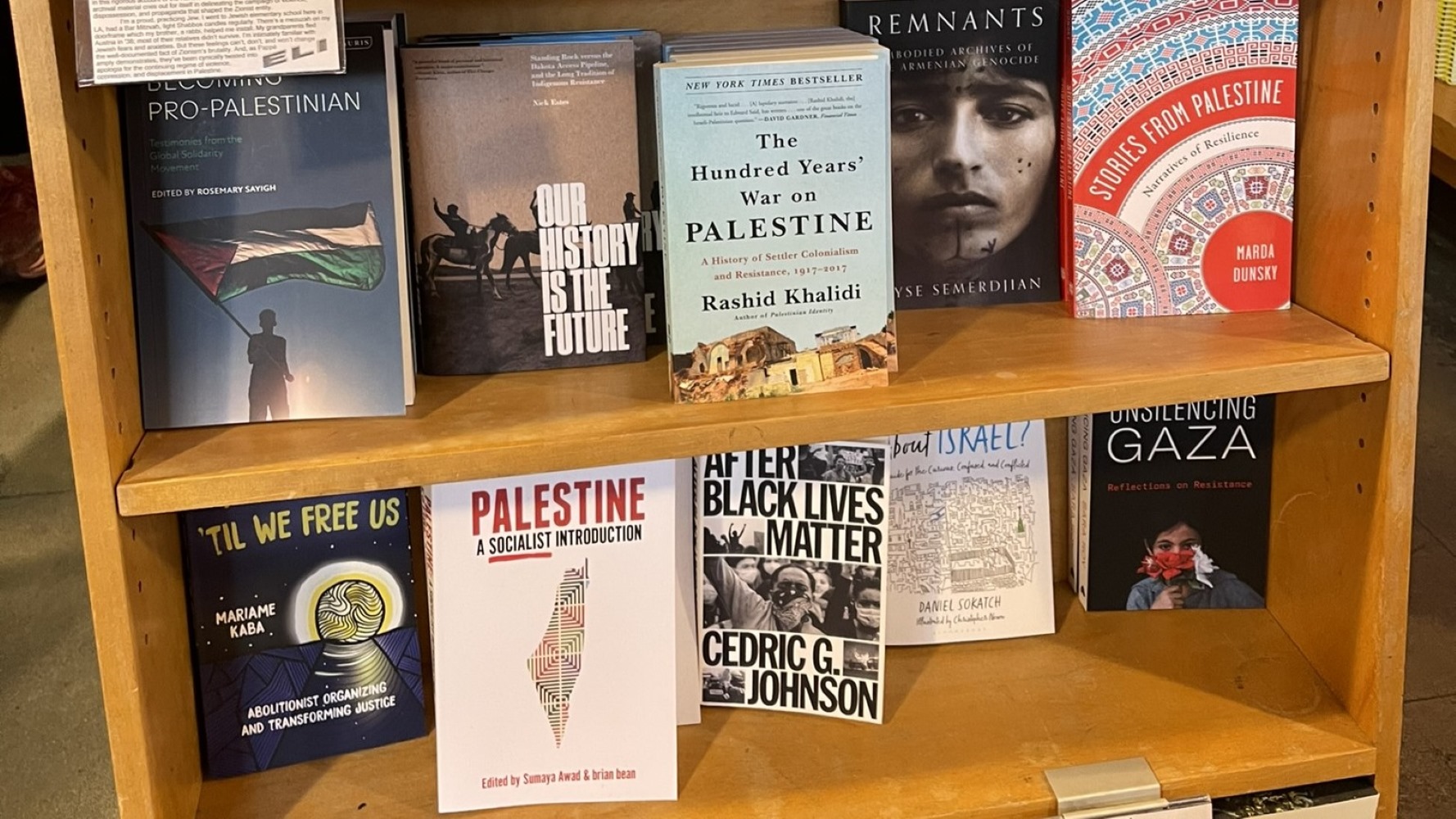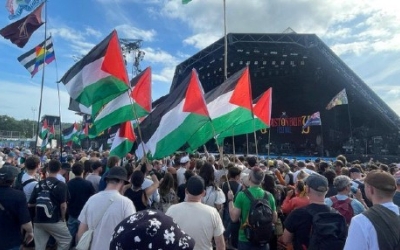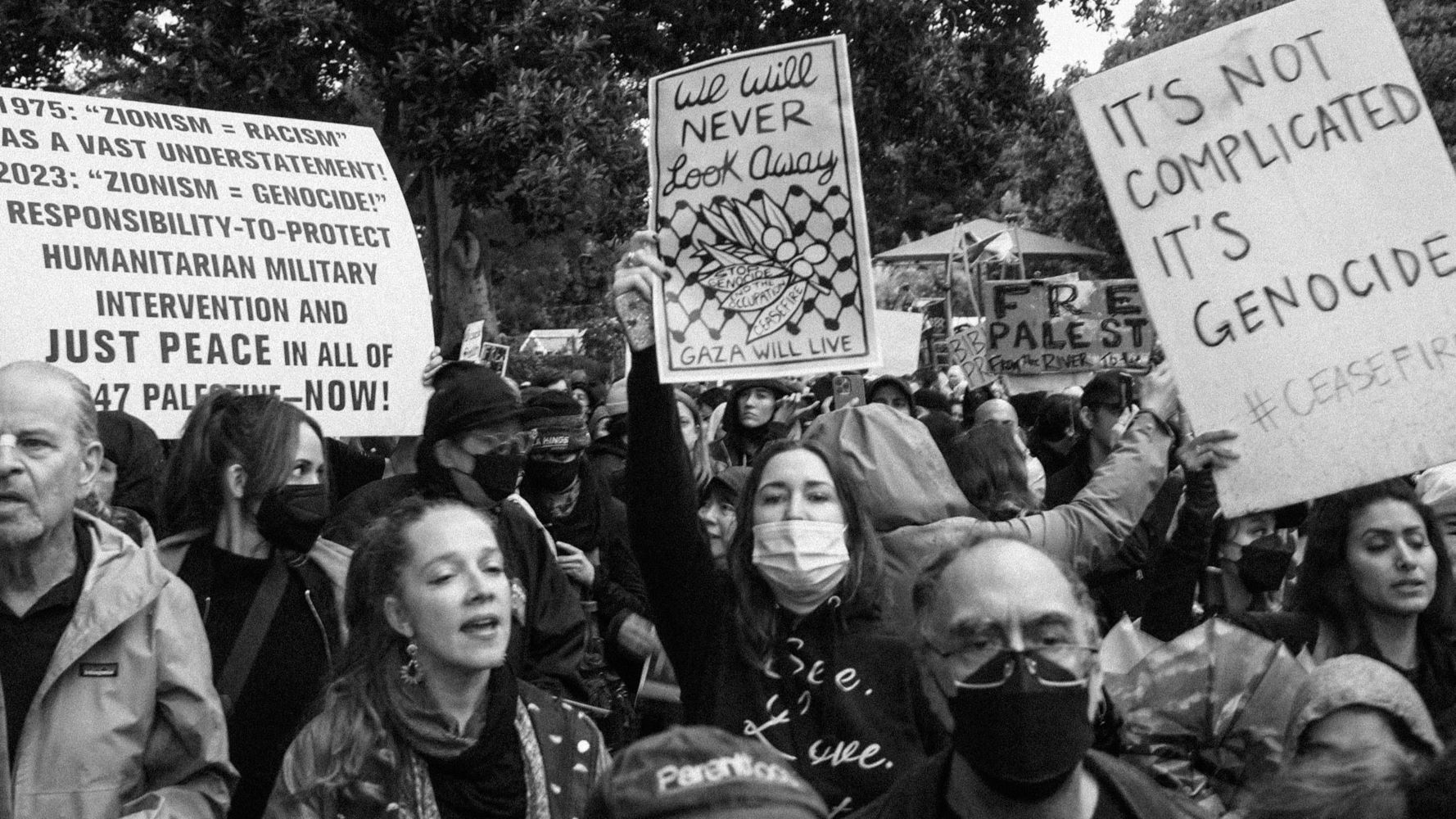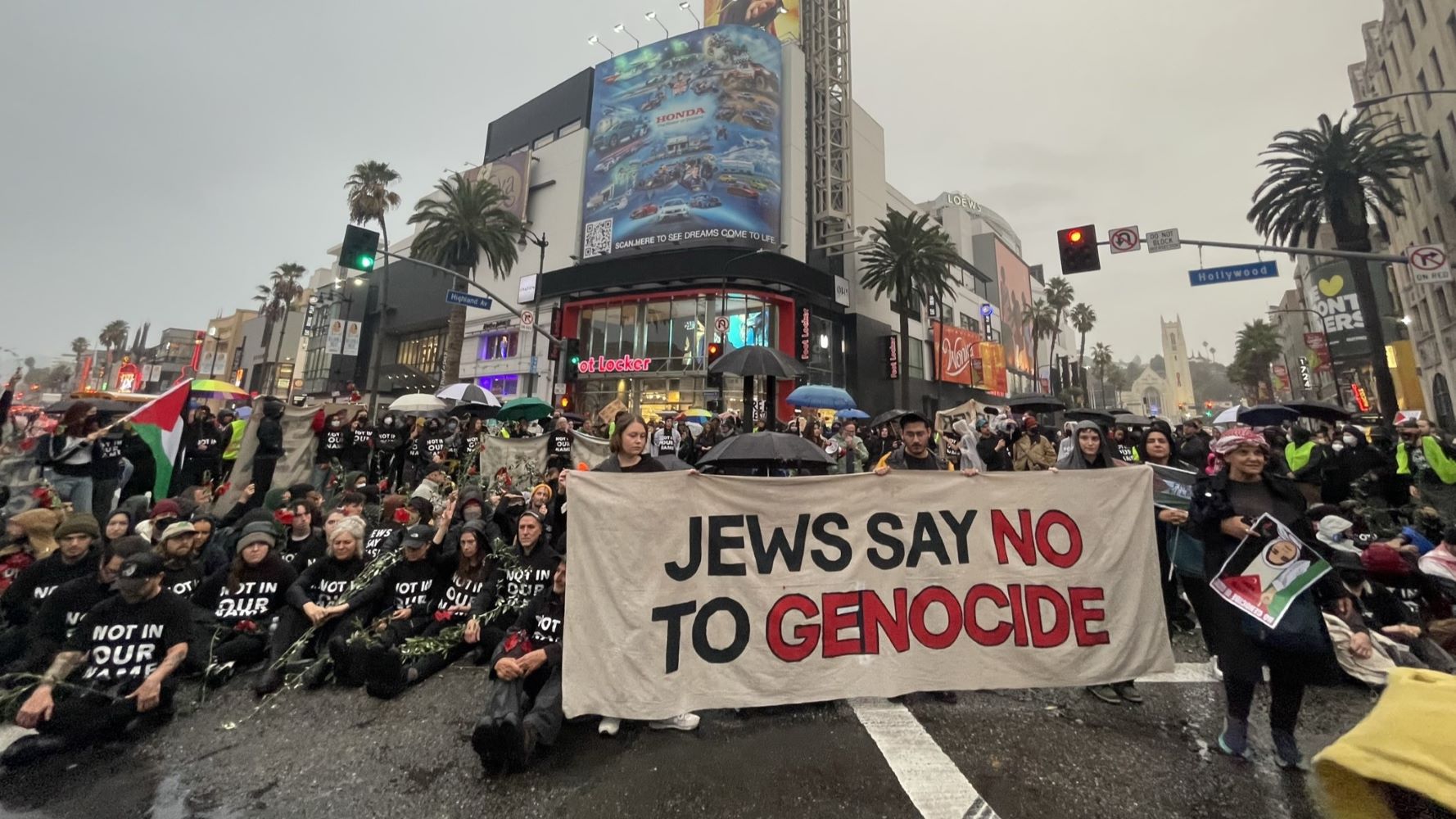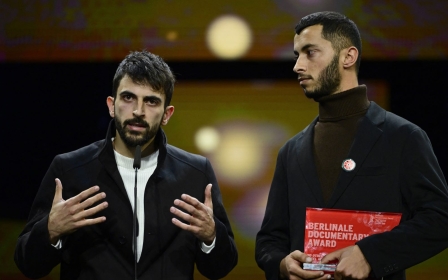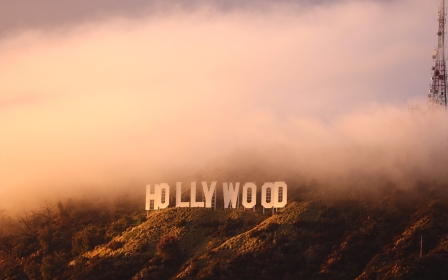Looking for Gaza in California: How Palestine took over family, Hollywood and campuses
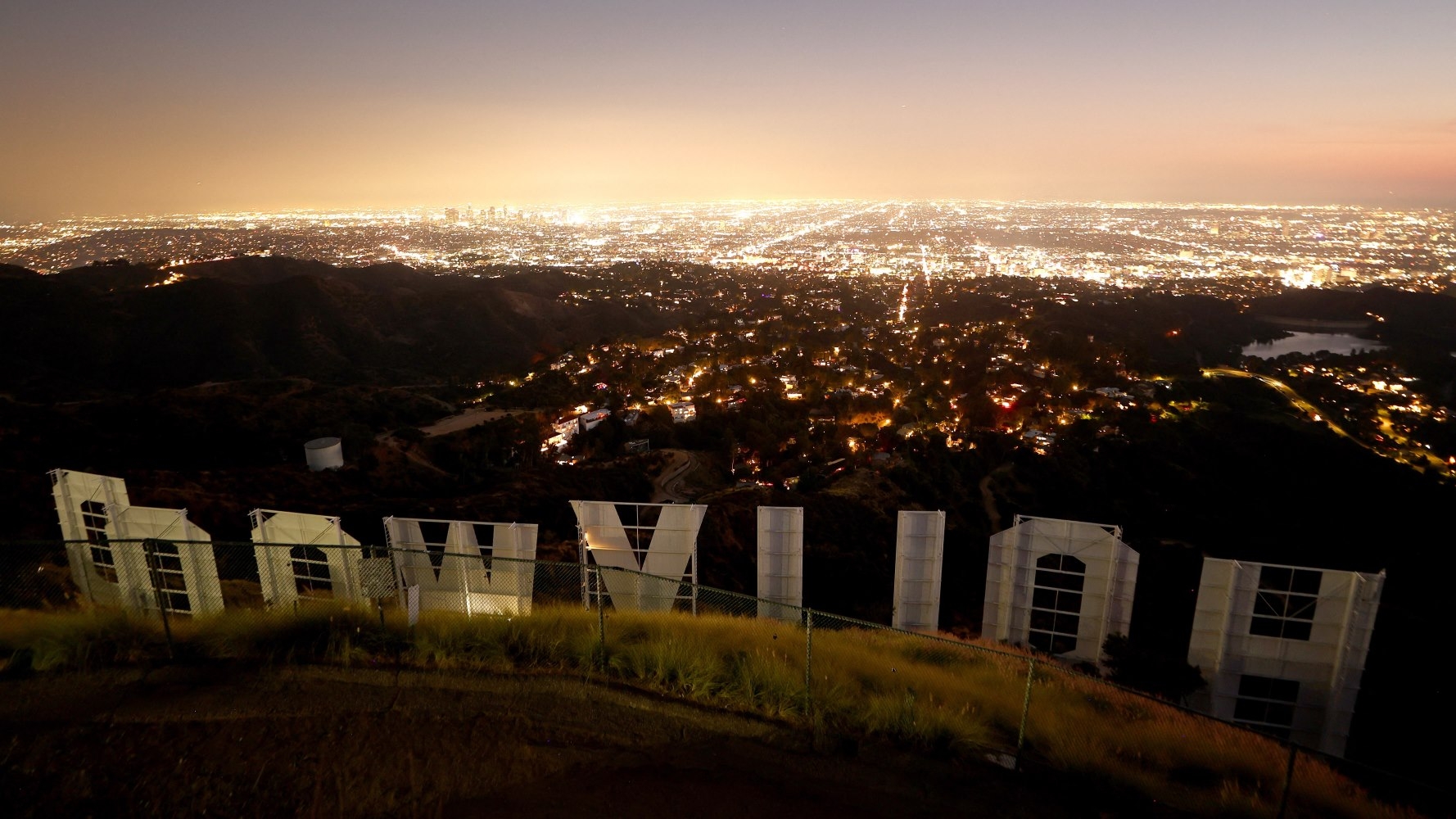
There’s something quite daunting about Christmas. On one hand, there’s an oppressively demanding expectation for family gatherings and gift rituals that render whoever refuses to celebrate an outsider and misfit.
For my family, Christmas has become a grand fair where the value of every member is judged on the gifts offered at the altar of this hyper consumerist spectacle.
In recent years, especially since Trump’s ascendance to power in 2016, Christmas has turned into a battlezone one needs to carefully manoeuvre around or risk being the target of right-wing missives that usually end in ugly altercations and the temporary severance of family ties.
After 7 October, I decided to skip my annual California Christmas gathering.
I found out that a member of my family, an Egyptian evangelical-convert, had posted “I stand by Israel” on their social media account.
New MEE newsletter: Jerusalem Dispatch
Sign up to get the latest insights and analysis on Israel-Palestine, alongside Turkey Unpacked and other MEE newsletters
My cousins later told me that a conversation about the subject with this family member had ended in a barrage of xenophobia and theories on the rapture and Armageddon in the Holy land that would lead to the second coming of Jesus.
I was jaded. The first weeks of the war were gruelling for longtime observers of the Israeli-Palestine conflict: the blatant media bias in coverage; the silencing of pro-Palestinian voices; the casting of Arabs as Hamas or terrorism apologists.
The emotional drain of helplessly watching Palestinians murdered every day as the world stood idle left me unable to confront the pro-Israel sentiment that the conservative members of my family adopted.
The Beverly Hills bubble
I delayed returning to California for four months, but I finally decided to go back when the University of Southern California invited me for a film discussion in March - shortly after Jonathan Glazer’s Oscars speech, in which the Academy Award winner condemned the “hijacking” of the Holocaust to justify Israel’s actions in Gaza.
Southern California is one of the most socially isolating places I’ve ever been in: a huddle of suburban beach cities secluded from one another and sharing no centre.
The neighbourhoods encircling Hollywood and Downtown LA have more life and culture to them, except that only a few well-off families reside there.
California has the highest rate of homelessness in America, a reality unseen by most upper-middle-class families who seldom leave their suburban enclaves. The southern part of the state is highly segregated, and it’s hard not to notice that the vast majority of those who use public transport are people of colour.
Unsurprising then that Beverly Hills - the preferred district of the ultra rich - is inaccessible by most public transport. The area is essentially Hollywood housing, an artificial oasis sheltered from the larger reality of the state.
The fact that the neighbourhood has been covered with Israeli flags since 7 October is a testament to the isolation of the rich not only from the reality of the world, but of the new America itself.
Beverly Hills represents the old protectionist Hollywood that has adhered to the rigid code of moderate leftism forged not to change the stagnant political and economic system but to sustain it: a system that pretends to be more progressive than it actually is thanks to calculated liberal gender politics and a growing acceptance of racial diversity.
It’s a system that has been exposed by two of the biggest events in American popular culture this year: Jonathan Glazer's Oscars speech and nation-wide protest encampments in support of Palestinians in Gaza.
Hollywood and Palestine solidarity
Much ink has been spilt on Hollywood’s decades-long love affair with Israel and the vehement witchhunt of pro-Palestinian voices in Tinseltown.
That is why Glazer's speech was so stunning: a powerful statement by an acclaimed filmmaker who happens to be Jewish, whose award-winning film, The Zone of Interest, is about the Holocaust.
What was remarkable was not just the speech, but the aftermath. An initial letter signed by a group of Jewish American talents condemned Glazer. Another letter expressed solidarity with the Sexy Beast director, describing the campaign against him as a “dangerous distraction” from the mounting death toll in Gaza.
For once, voices in Hollywood have taken risks and stood against the current
Signatories to the latter included 500 Hollywood heavyweights, including Joaquin Phoenix, Elliott Gould, Todd Haynes, Joel Coen and various top executives.
Tony Kushner, one of America’s most iconic playwrights and a frequent Steven Spielberg collaborator, described Glazer’s speech as an “unimpeachable, irrefutable statement”, going as far as calling Israel’s actions in Gaza “ethnic cleansing” in an interview with Haaretz.
The show of support for Palestine did not stop there. Despite prohibition of any political statements, numerous figures used the spotlight in Cannes to subtly show support for Palestine, including Bella Hadid and Cate Blanchett.
Egyptian-American stand-up comedian and Golden Globe winner Ramy Youssef has also tirelessly drawn attention to the situation in Gaza; Jon Stewart, meanwhile, continues to be the sole American talk-show host to fiercely criticise Biden’s policy on Palestine.
For once, voices in Hollywood have taken risks, stood against the current and shown the kind of moral bravery that is yet to be matched by European cinemas, besides France.
Palestine and the grassroots
This solidarity with Palestine is also palpable in disparate parts of California: from the prominent Palestinian section in Los Feliz’s hugely popular bookstore, Skylight, and the “Free Palestine” slogans adorning cafes, to the pro-Palestine leaflets distributed by middle-aged activists in LA music halls.
The encampments, however, were the biggest manifestation of the rising pro-Palestine sentiment. I have attended various encampments across California.
Most of the students I talked to were not engaged with the Palestinian cause prior to 7 October; the majority were not aware of the gruelling realities of Gaza.
Many called their senate representatives and mayors to demand a ceasefire; all were ignored.
The encampments did not occur in a vacuum or happen on a whim, they were an expected response to the silence of both politicians and university chiefs.
Before the protests at the end of April, students were organising lectures, seminars, and film screenings. For months, the students shared book recommendations, spoke on podcasts, protested, and defended what they believe to be a just cause.
The school year is partially over, but these protests have not stopped. The spirit of the encampments remains as palpable as it was a month ago.
There has been no other instance in American history where an Arab issue has occupied the centre of American culture in the fashion Palestine has since 7 October.
Students from a diverse array of backgrounds see Palestine as the juncture of so many issues that have defined the 20th century: intersectionality, postcolonialism and social justice.
These issues have long been seeping into independent American cinema.
Divisions within the family
My family, on the other hand, was quite ambivalent about the whole saga. One member told me that Palestine is a superfluous matter and that America should have nothing to do with it. Another told me that it’s too “big of a headache” and they’d rather not get involved.
The worst came during a testing Easter gathering where one member, who still believes in the righteousness of the Palestinian cause, utterly dismissed the encampments, using the scant number of violations to paint a generalised violent picture of the protests.
The family member believed that the protesters should turn the other cheek, wear victimhood proudly on their sleeves. They were incensed by the sight of the few protesters who replaced the American flag with the “shitty” Palestine one, a comment they admittedly retracted later.
They believe that severing ties with Israeli institutions is against the fundamentals of the capitalist system. The morality of this system, however, was never part of the conversation. The US-sanctioned killings of Palestinians took a back seat to the transgressive flag incident.
My family is good-natured and God-fearing. They are people who work hard to set a good example for their children. But I always found their politics morally questionable.
The conservative faction, all Trump supporters, believe that “not all colonialism is bad because it brought poor countries electricity” and that migration is a problem, even though they’re immigrants themselves.
The relatively liberal side is engaged with race politics. They are ardent supporters of the Black Lives Matter movement and against everything Trump stands for. What the reaction to encampments has illustrated are the limitations to this moderate yet sterile brand of liberalism.
Like many of the boomer white-collar class, my family has benefited from capitalism - the American dream their parents sought. For my relatives, there are tangible limits to criticism of the US.
The subject of American imperialism is a taboo issue and instead an unbending conviction in American exceptionalism informs my family’s belief in a country they consider the world’s greatest.
The encampments represent a threat to that system: a legitimate challenge to America’s self-righteousness.
For a class whose core existence is tied to the sustainability of that system, hostility towards this growing student movement is not entirely unanticipated.
Indifference as the opposite of love
The most disheartening facet of my family’s position is that it ironically contrasts with their adopted Christian beliefs. Jesus, after all, was a rebel who challenged the political system of his time. Defending the persecuted and beaten-down is a key part of Christianity.
For millions like me who do not subscribe to any particular creed, Palestine has always been an inherently moral cause foremost.
The vocal support for a people whose land has been looted for decades, whose children are murdered every day, who are treated like animals by the most powerful army in the Middle East, is the bare minimum for anyone believing in the universal imperative of justice.
I felt at home in the California campuses - a utopian vision of what a righteous America is and what it could be
In his 2005 anthology Resistance, the late American novelist Barry Lopez writes that “The opposite of love is not hate; it’s indifference”.
The dynamics of organised religion lend its adherents a way of avoiding thorny issues that require courage. Giving money to faceless charities to support those in distant lands provides a moral self-satisfaction despite its superficiality.
The Pro-Israel lobby - who vowed to spend millions to influence the forthcoming US presidential elections - remain as strong and powerful as before.
Standing up to these powers - whether it’s the Hollywood talents or the encampment students - continues to represent a career risk.
All campaigners, whether they are students or film stars, have something to lose by speaking about Gaza.
Many have failed Palestinians: Arab regimes, western governments, business leaders, art institutions, religious bodies. Figures in the upper echelons of power - in art, business, and politics - still don’t know how to deal with Palestine, adopting the same gutless position and clinging to the hope that the storm will pass.
Gaza is the 1968 of our time - a transformative historical movement carried over by a rebellious generation fighting for fairer, more ethical policies.
Filmmakers like Glazer are fighting on the same front and for the same purpose: to unsettle the upper classes and confront them with the moral implications of their passivity. The Zone of Interest - by a sheer freakish coincidence - has captured the zeitgeist of the moment.
For months, I was planning to have a big confrontation with the family members who expressed their support for Israel on 7 October, but I ultimately backed down out of fear of damaging our already frail relationship. In the ensuing months I spent in California, I never felt as estranged from my family as I did during that period.
The deafening silence and apathy of my family alienated me, but I felt at home in the California campuses - a utopian vision of what a righteous America is and what it could be.
I felt at home among my Arab, Israeli and Jewish filmmaker and artist friends who continue to risk their careers by speaking out about Gaza; among my fellow rootless, idealistic bohemian friends whose families are no different than mine.
For once, America felt like home - and it wasn’t because of family.
Middle East Eye delivers independent and unrivalled coverage and analysis of the Middle East, North Africa and beyond. To learn more about republishing this content and the associated fees, please fill out this form. More about MEE can be found here.



